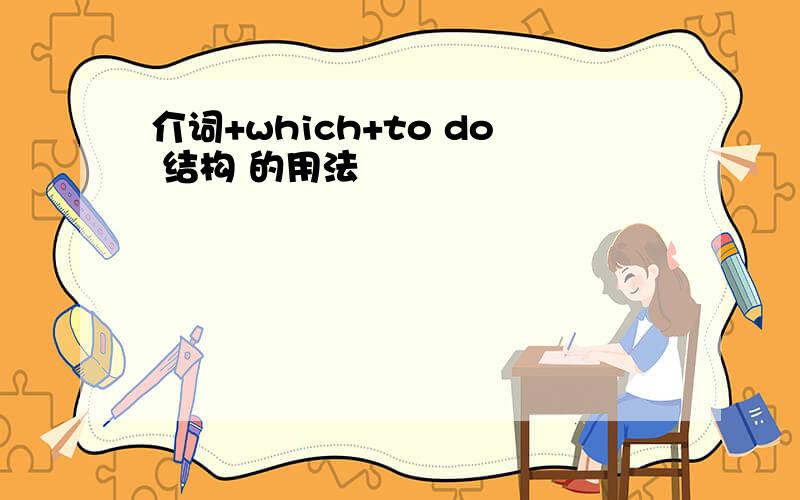介词+which+to do 结构 的用法
来源:学生作业帮 编辑:神马作文网作业帮 分类:英语作业 时间:2024/11/17 18:15:19
介词+which+to do 结构 的用法

在人教版高三英语课本中有这样一句话," Tomorrow would be Christmas Day,and Della had only $1.87 with which to buy Jim,her husband,a present." 句中"...with which to buy ..."究竟是一种什么结构?在我们的备课活动中,有的教师说是定语从句的省略,有的教师又否定,但有说不出是什么结构.
对于这个问题,首先我们不妨先来看一段选自由英国伦敦Hazell Watson and Viney LTD Aylesbury,Bucks所出版,由C.E.Eckersley编写的教材"Essential English for Foreign Students" 第三册十七课第124到125页,"Rules of Grammar" again一文中有这样一段话:It's about Sir Winston Churchil when he was Prime Minister of England.He had written out an important speech that he was going to give,and he handed it to one of his secretaries to type.When he got it back he found that the secretary had gone through the speech and changed all the sentences that ended with a preposition.Sir Winston marked all these alterations in red ink and wrote underneath:This is the sort of English up with which I will not put."
在本文中另外一段对话:Professor Grey:Oh!Priestley,you're the very man I wanted to see...About that book of yours..you know,Spoken English or something...Well,one of the mistakes may be a misprint.But the other can't be.You've put a preposition at the end of a sentence.
从这两句话可以推断,在早期的英语中,那些认为有教养的英国人认为,我们不应该用一个介词来结束一个句子.而应该将其介词放在句中.
所以,在我的英语教学中,我将这种现象取名为"藏句尾介词法".它不是一个定语从句的省略,所以,类似in which不能象定语从句一样换成where或when等关系副词.随着语言的发展,人们已经习惯于将介词来结束一个句子,比如:That's a fine person to learn English from.And both you and your publishers will be laughed at.等.
但课文中的这句话Della had only $1.87 with which to buy Jim,her husband,a present.我们当然可以表达为:Della had only $1.87 to buy Jim,her husband,a present with.但是介词with与其宾语 $1.87就显得离得太远,不太符合语句紧凑原则,所以作者采用了旧式英语中"藏句尾介词法",已 达到语句紧凑的目的.
对于这个问题,首先我们不妨先来看一段选自由英国伦敦Hazell Watson and Viney LTD Aylesbury,Bucks所出版,由C.E.Eckersley编写的教材"Essential English for Foreign Students" 第三册十七课第124到125页,"Rules of Grammar" again一文中有这样一段话:It's about Sir Winston Churchil when he was Prime Minister of England.He had written out an important speech that he was going to give,and he handed it to one of his secretaries to type.When he got it back he found that the secretary had gone through the speech and changed all the sentences that ended with a preposition.Sir Winston marked all these alterations in red ink and wrote underneath:This is the sort of English up with which I will not put."
在本文中另外一段对话:Professor Grey:Oh!Priestley,you're the very man I wanted to see...About that book of yours..you know,Spoken English or something...Well,one of the mistakes may be a misprint.But the other can't be.You've put a preposition at the end of a sentence.
从这两句话可以推断,在早期的英语中,那些认为有教养的英国人认为,我们不应该用一个介词来结束一个句子.而应该将其介词放在句中.
所以,在我的英语教学中,我将这种现象取名为"藏句尾介词法".它不是一个定语从句的省略,所以,类似in which不能象定语从句一样换成where或when等关系副词.随着语言的发展,人们已经习惯于将介词来结束一个句子,比如:That's a fine person to learn English from.And both you and your publishers will be laughed at.等.
但课文中的这句话Della had only $1.87 with which to buy Jim,her husband,a present.我们当然可以表达为:Della had only $1.87 to buy Jim,her husband,a present with.但是介词with与其宾语 $1.87就显得离得太远,不太符合语句紧凑原则,所以作者采用了旧式英语中"藏句尾介词法",已 达到语句紧凑的目的.